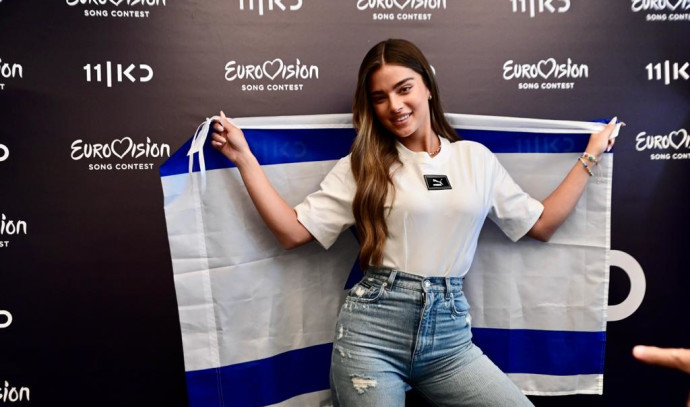All the different countries participating in the 2023 Eurovision Song Contest in Liverpool have put out their songs, so it’s time to see what competition awaits Israel’s Noa Kirel.
Only 37 countries will take part this year, most of whom are spread out between two semi-finals. Here, Israel will need to compete with 15 other songs and will need to make it into the top 10.
Now, if you’re too old for TikTok, this may be the most difficult Eurovision to watch – on the verge of being unbearable. In previous years, people discussed songs that are good opportunities for a bathroom break, but this year there will be plenty of time to spend in the bathroom.
A random test without any empirical research whatsoever determined that younger people tended to view it more favorably, writing statements like “This Eurovision is perfect, I put so many songs on my playlist.”
Last year, I wrote that the 2022 Eurovision was “a collection of generic songs at best, lousy songs at worst and anesthetizing in most cases.” If only I knew then what I knew now, I wouldn’t have wasted the sentence back then.
So with great difficulty, I sat down to listen to all the different songs and clips to estimate how high Noa Kirel‘s chances are of bringing Israel back to the Eurovision finals after a one-year hiatus.
Let us know in the comments how many songs you managed to survive past the first 30 seconds and we’ll know if you’re Gen Z.
(The figures for making it to the finals refer to Eurovision since 2008, when the format was changed to include semi-final rounds. Survey data and betting odds were accurate at the initial time of writing but are subject to change)
Croatia: “Mama ŠČ!” by Let 3
- Appearances in the finals: 4/12, 33.3%
- Highest ranking: 4th place in 1996 and 1999
The last time Croatia made it to the finals was in 2017, but it hasn’t cracked the top 10 since 2001.
After getting 11th in the semi-finals two years in a row, Croatia has now changed its approach and has unleashed a disturbing performance. It is rife with Eurovision cliches crammed into two minutes and 40 seconds with silly lyrics.
But just call it a “protest song” and it gets a standing ovation from the crowd.
Betting odds for Croatia see it ranked 15th in terms of chances to win, but a survey ranked it at 16th best song overall.
If there is any justice in the world, this song will be one of the five that won’t qualify for the finals, but it absolutely still could – and that would make Eurovision even worse.
Ireland: “We Are One” by Wild Youth
- Appearances in the finals: 5/14 – 35.7%
- Highest ranking: 7 victories (1970, 1980, 1987, 1992, 1993, 1994, 1996)
- Last place rankings: 2007 and 2013. Last places in the semi-finals in 2019 and 2021
The country that took home seven Eurovision trophies has since become a joke.
Ireland hasn’t reached the Eurovision finals for three years i na row and if they do manage to reach it this year, it will only be because of all the terrible songs from the other countries.
The lyrics of this song seemed to have come out of giving a generative artificial intelligence the input of “Write a song to show how we’re all different but also all alike and that there will be both inclusion and diversity.”
For some reason, they also decided to cover their faces in the music video, as if Norway in 2022 didn’t do that in a much, much cooler and better way.
Betting odds for Ireland rank it at 25 and surveys rank it at 23.
Latvia: “Aijā” by Sudden Lights
- Appearances in the finals: 3/14 – 21.4%
- Highest ranking: Won in 2002
- Last place rankings: In the semi-finals in 2009, 2010, 2013, 2017 and 2021
For five consecutive Eurovisions now, Latvia has been kicked out of the contest in the semi-finals, and it seems 2023 won’t be good for them either.
Betting odds currently have Latvia at an embarrassing 35th place, with the survey finding it at 25.
The song wasn’t written specifically for Eurovision and seems to be a jungle-rock piece written as a lullaby for the difficult times we find ourselves in.
Their goal is to give the viewers the feeling of a Manskin-style live performance, but while the song is rather likable, it won’t have the same end result as the Italians.
Malta: “Dance (Our Own Party)” by The Busker
- Appearances in the finals: 7/14 – 15%
- Highest ranking: Second place in 2002 and 2005
- Last place rankings: Three times, in 1971, 1972 and 2006
Every time Malta doesn’t send a singer who screams their soul out, I’m satisfied – especially if it isn’t some worn-out ballad.
It could have been great if it was more than just a cute song, or if it was injected with more charisma. This song just starts and ends in the same way. Moldova already did the saxophone trick twice and succeeded – this looks like the Ali Express version.
Betting odds aren’t in Malta’s favor, putting them at 31 and with the survey putting them in last place.
Norway: “Queen of Kings” by Alessandra
- Appearances in the finals: 12/14 – 85.7%
- Highest ranking: Won in 1985, 1995 and 2009
- Last place rankings: 11 times, in 1963, 1969, 1974, 1976, 1978, 1981, 1990, 1997, 2001, 2004 and 2012
Once considered one of the biggest Eurovision flop countries has managed to reach the finals almost every year since the two semi-finals format was introduced.
Dressed in a costume that looks like it was bought on Wish, Alessandra won Norway’s preliminaries in a landslide and is liked by the fans.
Betting odds place her as 4th most likely to win and fans rank her at No. 5, so she seems guaranteed a spot in the top five.
Except maybe not, because Norway’s preliminaries were done with auto-tune, which is banned in Eurovision itself.
Portugal: “Ai Coração” by Mimicat
- Appearances in the finals: 7/12 – 58%
- Highest ranking: Won in 2017
- Last place rankings: Four times, in 1964, 1974, 1997 and 2018
Portugal’s songs are usually outdated and irrelevant – even by Eurovision standards.
If last year Portugal sent a ballad that could warm a heart made of stone, this year is more shiny and colorful but lacks any “wow” effect.
It might make it to the finals. It might not. No one will really care. But if it does make it to the finals, it could easily end the night with zero points.
The betting odds aren’t impressive and rank it at 26. The survey carried out, though, was much kinder and put it at a respectable eighth place.
Serbia: “Samo Mi Se Spava” by Luke Black
- Appearances in the finals: 10/13 – 76.9%
- Highest ranking: Won in 2007
When we’re children, we try to avoid going to sleep. Now that we are older and wider, we can identify with the meaning of Serbia’s song: “I just want to sleep.”
Luke Black says he wrote the lyrics while stuck in bed playing video games during the COVID-19 pandemic. He also said he completed it in just 15 minutes over Zoom with the help of friends from Lebanon, Canada and London.
If only he had a good voice. As it is now, it isn’t uplifting. Serbia will probably make it to the final, but won’t win. Betting odds put it at 16th place while the survey put it at 12th.
Azerbaijan: “Tell Me More” by TuralTuranX
- Appearances in the finals: 13/14 – 92.9%
- Highest place ranking: Won in 2011
Azerbaijan is one of the two countries with the highest rate of making it to the finals. In fact, they only ever failed to do so in 2018, when Neta Barzilai won for Israel.
The Azerbaijanis like to send heavy ballads and singers who perform somewhere between screaming and growling. But this year’s song is very different from the norm.
This is a cute song reminiscent of British rock compilation albums from 1997.
Betting odds put Azerbaijan at 23rd and the survey put it at 22nd, so it seems Azerbaijan will do what it does best: Make it to the finals and finish low on the scoreboard.
The Czech Republic: “My Sister’s Crown” by Vesna
- Appearances in the finals: 4/9 – 44.4%
- Highest ranking: Sixth place in 2018
- Last place rankings: In the semi-finals of 2007 and 2009
No, no, no, this song isn’t about COVID.
The betting odds favor this song and ranked it eighth place with fans ranking it at 11th.
This song will probably make it to the finals, but it’s hard to see it making it to the top. It isn’t interesting enough. We’ve heard many songs like this in Eurovision before, and there is used chewing gum that’s been used less than the message of women’s empowerment at Eurovision.
Finland: “Cha Cha Cha” by Käärijä
- Appearances at the finals: 8/14 – 57.1%
- Highest ranking: Won in 2006
- Last place rankings: Nine times, in 1963, 1965, 1968, 1980, 1982, 1990, 1992, 1996 and 2009, and twice in the semi-finals, in 2015 and 2019.
This kind of song has no right to exist outside of Eurovision and would never have been written otherwise.
For some reason, Käärijä managed to gain success here and the betting odds place this song at No. 2 in terms of being likely to win and the survey ranked it in third place.
I personally would rather it never make it past the semi-finals but when all of Liverpool shouts “Cha Cha Cha” and blows the roof sky-high, the votes will come in droves.
Moldova: “Soarele şi Luna” by Pasha Parfeni
- Appearances in the finals: 9/14 –64.3%
- Highest ranking: 3rd place in 2017
Pasha Parfeni participated in the 2012 Eurovision Song Contest in Baku and came out in 11th.
This year, he puts on a selection of carpets from his grandmother’s house and storms the stage accompanied by women with elkhorns, drummers and a flutist who doesn’t even pretend that the music isn’t live.
Betting odds place it at 17th and the survey at 30th, but there’s enough of the typical Eurovision cliches that could win some more votes.
The Netherlands: “Burning Daylight” b Mia Nicolai and Dion Cooper
- Appearances in the finals: 8/14 – 57.1%
- Highest ranking: Won in 1957, 1959, 1969, 1975 and 2019
- Last place rankings: Four times, in 1958, 1962, 2963, 1968 and in the semi-finals in 2011
Two successful singers in the Netherlands teamed up for a duet they wrote together with Duncan Laurence, winner of the 2019 Eurovision Song Contest in Tel Aviv. After the moving ballad in Dutch we got last year, this year we got one that’s cute but lackluster.
The betting odds place this at 19th place and the surveys at 20th. This doesn’t bode well for the Dutch duo.
Sweden: “Tattoo” by Loreen
- Appearances in the finals: 13/14 – 92.9%
- Highest rankings: Won six times, in 1974, 1984, 1991, 1999, 2012 and 2015
- Last place rankings: 1963 and 1977
The 2023 Eurovision is set to be a historic one, and not just because of the sheer amount of bad songs.
If it all goes to plan, Sweden will win Eurovision for the seventh, equalling Ireland’s record, and it will be the second time in history that an artist who won Eurovision before will win again, and the first time ever for a female artist.
All in all, there is nothing groundbreaking here. It’s rife with elements “borrowed” from a Ukrainian singer, but there is plenty of excellent Swedish efficiency.
Betting odds and a fan survey both rank it as No. 1.
Switzerland: “Watergun” by Remo Forrer
- Appearances in the finals: 5/14 – 35.7%
- Highest rankings: Won in 1956 and 1988
- Last place rankings: Five times, in 1964, 1967, 1974, 1998 and 2011, and four times in the semi-finals, in 2004, 2010, 2015 and 2016
After many years of a pre-Eurovision format, Switzerland has only recently switched to a new way to select their artist.
In the three Eurovisions since then, the Swiss qualified for the finals every year, but after two very successful years – with a strong fourth place in Tel Aviv and third place in Rotterdam – they only made it to 17th place last year.
Like last time, the Swiss in 2021 are sending an old-fashioned ballad sung by a tormented young man with a deep voice that doesn’t match his face.
The Swiss should be the most worried about the change in voting in the semi-finals, which now lacks judges. Last year, they made it to the finals on the judge’s votes, while the audience ranked them in last place. In the finals, the judges ranked them in 12th place while the audience gave them no points at all.
Currently, betting odds put the Swissat 14th place but the survey ranked it at 31st.
Israel: “Unicorn” by Noa Kirel
- Appearances in the finals: 9/14 – 64.3%
- Highest ranking: Won four times, in 1978, 1979, 1998 and 2018
Yes, we saved the best for last. Noa Kirel, Israel’s Eurovision representative, is the woman who caused the most buzz and anticipation for this year’s contest – until Loreen came along.
Betting odds regularly rank Israel between 5th and 9th place, but pay attention to the survey: Israel is ranked second. True, a significant margin below Sweden, but closer than anyone else.
The cliche “it’s all about the live performance” has never been more true and we can only imagine what Kirel’s crew has in store for us in Liverpool.



